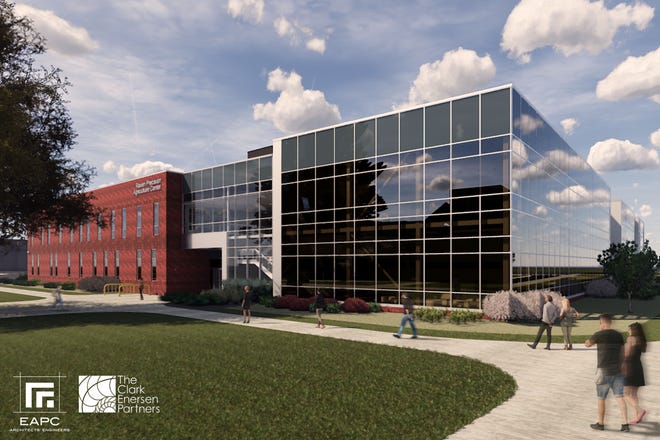
Advancements in agricultural technologies are critically important for a strong, sustainable agriculture industry.
Investing in these critical technologies, which include integrations with ag equipment and sensors, is improving production to not only support a solid economic recovery and growth across the country, but also to contribute to a healthier global environment.
South Dakota State University is leading the nation in this area.
Through its precision agriculture program and a new state-of-the-art facility, South Dakota State University is providing students with the knowledge and expertise to raise more food and to do so in a more environmentally and economically sustainable way using technologies to enhance farming and ranching practices.
The university’s Bachelor of Science degree in precision agriculture — the first of its kind in the nation — prepares students for careers that bridge the gap between agronomy (the science and technology of crop production and soil management), agriculture machinery management and data sciences.
South Dakota State University also offers a minor in precision agriculture. It is the only land-grant university in the nation to offer both a major and minor in the field.
Precision agriculture uses technologies to ensure that crops and soil receive exactly what they need to grow at an optimum level. This reduces the amount of water, fertilizer and pesticides that are needed, helping to keep food prices down. This in turn contributes to a stronger economy, healthier environment and better worker safety.
To prepare students for careers in precision agriculture, South Dakota State University this fall will open its state-of-the-art Raven Precision Agriculture Center. The world-class facility will set the standard for the university’s precision agriculture major.
The facility will further position South Dakota a national and global leader in the precision agriculture industry and play a significant role in ecosystem sustainability, university officials said.
“When we designed the building, we intentionally made the building very student-centered,” David Wright, head of the Department of Agronomy, Plant Science and Horticulture said. ”There are 22 collaborative spaces for students of several disciplines to come together in semiprivate rooms to be able to study and areas where students can just hang out.
“We positioned the building to create a hub of student activity. It’s adjacent to the Animal Science Department complex, it’s across from McFadden Biostress Laboratory where ag students take plant science classes as well as biology classes and classes related to natural resource management and it’s just up the road from Davis Dairy Plant. This will be a hub of student learning and activity.”
The degree is a collaboration between the university’s Department of Agricultural and Biosystems Engineering and the Department of Agronomy, Horticulture and Plant Science. The precision agriculture curriculum also incorporates other disciplines from across the university.
Students in the precision agriculture program take classes in data analytics, GPS-GIS technology, soil sciences, precision crop production, sensor technology and precision farm machinery.
“We wanted to create an ecosystem for student learning and collaborative research,” Wright said. ”There are a lot of precision tools out there and they’re rapidly emerging. A tool can go from design to production in nine months.
“Precision ag is the coupling of those precision tools with the knowledge of how to best utilize them so growers can increase profitability. We will be equipping students with the knowledge behind the technology and how you use it to produce the best results for growers.”
South Dakota State University’s program also stands out in the nation because it incorporates research and industry feedback into its curriculum. The curriculum continues to change as new research and approaches are identified.
“The College of Agriculture, Food, and Environmental Sciences is committed to driving advancements in agriculture and natural resource management, both animal and crop agriculture, to enhance the global competitiveness of South Dakota’s farmers and ranchers,” Wright said. ”Our research focus is on advancing best management practices for improved profitability, creating an increased demand for a highly trained workforce.”
To learn more about South Dakota State University’s Bachelor of Science degree in precision agriculture and its impact on the agriculture industry and national economy, visit sdstate.edu.
Members of the editorial and news staff of the USA TODAY Network were not involved in the creation of this content.





More Stories
U.S. charges FTX founder Sam Bankman-Fried with criminal fraud
Time series forecasting with XGBoost and InfluxDB
Full-stack engineering is one-third as good